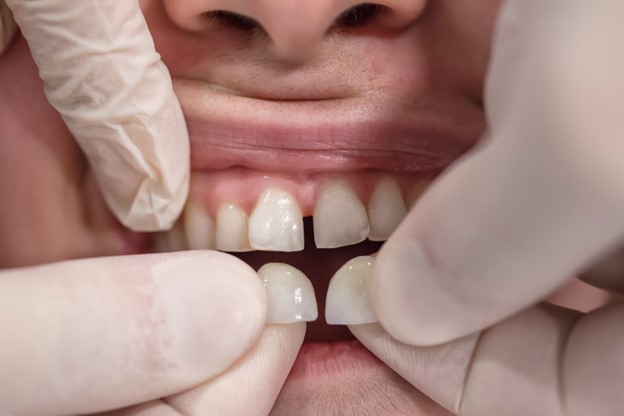Have you ever wondered what happens when a tooth falls out? There are a lot of myths and stories out there, but do you know the truth?
- Natural Shedding
- Tooth Decay
- Gum Disease
- Trauma
- Orthodontic Treatment
- Impacted Teeth
- Age-Related Changes
- Medical Conditions
- Poor Oral Hygiene
- Smoking and Tobacco Use
- Poor Nutrition
- Bruxism (Teeth Grinding)
- Genetics
- Dental Procedures
- Infection
- Root Resorption
- Osteoporosis
- Dental Implants and Prosthetics
- Discover Tooth Loss Reality When a Tooth Falls Out
Well, we’re here to help you understand! Our article unravels dental reality facts.
Trust us, it’s more intriguing than you think! We promise you’ll gain insights that can be helpful for your dental health.
Please stick with us to discover a world hidden right within your mouth!
Natural Shedding
When we’re little, our first set of teeth, also known as baby teeth or milk teeth, fall out naturally. This happens because our mouth is making way for our permanent teeth. It’s an essential part of growing up, and it usually starts around the age of six.
But don’t worry, it doesn’t hurt when our baby teeth fall out. Our bodies cleverly dissolve the roots of these teeth to make it easier for them to fall out. Then, our new adult teeth have plenty of space to grow in their place.
Tooth Decay
Tooth decay is another reason a tooth might fall out. This happens when harmful bacteria in our mouth build up over time and attack our teeth. These naughty little bugs can create holes in our teeth, called cavities.
If we don’t take care of these cavities, they can get bigger and bigger. Eventually, our teeth might become too weak and fall out. That’s why brushing our teeth twice daily and visiting the dentist regularly is super important.
Gum Disease
Gum disease is another sneaky culprit that can cause our teeth to fall out. It starts when there’s too much plaque on our teeth. This sticky stuff is filled with harmful bacteria, and if not cleaned off properly, it can irritate our gums and make them swell.
Over time, if we don’t take action, this can become a more serious gum disease called periodontitis. Our gums can pull away from our teeth and form spaces that get infected.
If left untreated, our teeth can become loose and may eventually fall out. So, let’s make sure to keep our gums healthy too!
Trauma
Sometimes, our teeth can fall out because of an accident or a hard bump. This is what we call dental trauma. It can happen while playing sports, during a fall, or even eating something hard.
When a tooth is knocked out this way, it’s important not to panic. The best thing to do is find the tooth and moisten it.
Then, get to a dentist as fast as possible. They might be able to put it back in!
Orthodontic Treatment
In orthodontic treatment, teeth may seem to ‘fall out,’ but it’s all part of a planned process. Orthodontic treatments, like braces or aligners, are used to correct issues with the alignment and spacing of our teeth. Over time, these treatments gently move our teeth into the right places, which can sometimes feel like our teeth are loose.
But don’t be scared! This is perfectly normal and means the treatment is working. However, if your tooth falling out starts to happen, you should contact your orthodontist immediately.
They will help you determine the next steps and ensure your smile stays healthy.
Impacted Teeth
Impacted teeth are teeth that have not erupted or grown properly into their proper position in the mouth. This condition often occurs with wisdom teeth, the last set of molars to appear in the late teens or early twenties. When there is insufficient space for these teeth to grow properly, they become trapped or ‘impacted’ within the jaw, leading to pain and other dental issues.
In some cases, impacted teeth may remain dormant and cause no problems. However, if they start to push against other teeth or become infected, they may need to be removed.
Regular dental check-ups are essential to detect and manage impacted teeth early, ensuring your oral health remains in tip-top shape. If you’re dealing with a loose tooth due to orthodontic reasons or other factors, read this article to learn how to save a loose tooth and explore potential solutions to maintain optimal oral health.
Age-Related Changes
As we get older, our bodies go through a lot of changes. This includes our teeth, too. Age-related changes can cause our teeth to wear down, change color, or even fall out.
Our gums can also change as we age. They can become thinner and recede, which can cause our teeth to become loose. This is why it’s essential to keep caring for our teeth and gums, no matter how old we are.
Medical Conditions
Certain medical conditions can also lead to tooth loss. For example, diabetes can impact our oral health significantly. High blood sugar levels can make our gums more susceptible to infection, eventually leading to tooth loss if not properly managed.
Heart disease and high blood pressure are other conditions that can affect our dental health. These conditions can lead to gum disease by reducing blood flow to the gums, making them more prone to infection. Remember, regular dental check-ups are as important as regular doctor’s visits to keep our whole body healthy.
Poor Oral Hygiene
Maintaining good oral hygiene is crucial in preventing tooth loss. Brushing and flossing correctly and regularly helps remove the plaque and food particles that lead to tooth decay and gum disease. Brushing twice daily and flossing once daily is essential to keep our teeth and gums healthy.
Neglecting oral hygiene can lead to a buildup of harmful bacteria, resulting in cavities and gum disease. If left untreated, these conditions weaken the tooth structure, eventually causing the tooth to fall out. Therefore, regular dental check-ups and professional teeth cleaning are necessary to detect and treat dental issues in their early stages.
Smoking and Tobacco Use
Smoking and using tobacco products can cause serious harm to our oral health and is a major risk factor for tooth loss. These products damage the gum tissue, leading to gum disease, which can cause the teeth to become loose and fall out. Nicotine, a chemical in tobacco, also restricts blood flow to the gums, hindering their ability to fight off infections and heal.
In addition to causing tooth loss, smoking and tobacco use can also lead to other oral health issues like bad breath, tooth discoloration, and an increased risk of oral cancer. It’s therefore crucial to avoid these products for our oral health. If you’re a smoker trying to quit, remember that it’s never too late to stop and that there are many resources available to help.
Poor Nutrition
A diet lacking essential vitamins and minerals can negatively impact oral health and potentially lead to tooth loss. Consuming excessive amounts of sugary foods and drinks can lead to tooth decay. At the same time, a deficiency in calcium and vitamin D can weaken our teeth and jaw bones, increasing the risk of tooth loss.
On the other hand, a balanced diet rich in fresh fruits, vegetables, lean proteins, and dairy products can significantly boost our oral health. These foods provide the nutrients necessary for maintaining strong teeth and healthy gums, reducing the risk of dental issues. So, remember to eat well for not just your overall health but also for a healthy smile!
Bruxism (Teeth Grinding)
Bruxism, commonly known as teeth grinding, is when a person grinds, gnashes, or clenches their teeth, often unconsciously, during sleep or while stressed. This can lead to excessive wear and tear of the teeth, causing them to become loose or even fall out. It can also result in jaw pain, headaches, and other discomforts.
Unfortunately, many people are unaware that they grind their teeth, as it often occurs during sleep. If not addressed, bruxism can lead to severe dental damage, including cracking, chipping, or loss of teeth. Therefore, regular dental check-ups are essential for early detection and effective treatment of this condition.
Genetics
Like many other aspects of our health, our oral health can be influenced by genetics. Some people may be genetically predisposed to have solid and healthy teeth. In contrast, others may be more prone to dental problems like cavities, gum disease, and tooth loss.
It’s important to remember, though, that while genetics can play a role, they aren’t the only factor that determines the health of our teeth. Good oral hygiene practices, a healthy diet, regular dental check-ups, and avoiding harmful habits like smoking can all help to keep our teeth strong and healthy, regardless of our genetic makeup.
Dental Procedures
Certain dental procedures can also result in tooth loss. For instance, tooth extraction may sometimes be necessary if a tooth is severely decayed, infected, or causing crowding in the mouth.
A professional performs this removal process. It is usually a last resort when the tooth cannot be saved through other treatments.
Similarly, a root canal, another common dental procedure, may occasionally lead to a tooth becoming brittle and susceptible to breakage, ultimately losing the tooth. Therefore, it’s essential to follow your dentist’s aftercare instructions carefully after a dental procedure to ensure the health and longevity of your teeth.
Infection
Infection can be a serious cause of tooth loss. An infection in the tooth, also known as an abscess, can cause severe damage to the tooth and the surrounding bone if not treated promptly. The infection can spread, causing pain and swelling. In severe cases, it may lead to the tooth being extracted to prevent further damage.
Many dental infections are the result of untreated cavities or gum disease. Poor oral hygiene can allow harmful bacteria to multiply, leading to infections that can cause tooth loss if left unaddressed. Regular dental check-ups and good oral hygiene practices are crucial in preventing such infections and maintaining healthy teeth.
Root Resorption
Root resorption is a dental condition that occurs when the body starts to ‘eat away’ or reabsorb the substance of a tooth, damaging or dissolving its structure. This process can start on the outside of the tooth, working its way towards the inner parts. It can be triggered by several factors, including trauma, pressure, and inflammation, or it could be an unfortunate outcome from some dental procedures like braces or tooth whitening.
Root resorption often does not show symptoms until it has progressed significantly, making it challenging to diagnose early. If left untreated, it can lead to tooth sensitivity, discoloration, or even tooth loss. Regular dental check-ups are crucial to detecting and managing this condition early, ensuring your oral health remains in shape.
Osteoporosis
Osteoporosis is a health condition that causes bones to become weak and brittle, making them more prone to fractures. This condition can also affect the bones in our jaws that support our teeth. If these bones become less dense, they can’t hold the teeth in place as firmly, which may cause the teeth to loosen and possibly fall out.
In addition to affecting the teeth directly, osteoporosis can make certain dental care difficult. For example, if the jaw bones are too brittle, they may be unable to support dental implants. Regular dental check-ups and maintaining a healthy lifestyle can help manage the impacts of osteoporosis on oral health.
Dental Implants and Prosthetics
Dental implants and prosthetics are often used as solutions for tooth loss. These are artificial tooth replacements that are used to counter tooth loss due to a variety of reasons. They can help restore the mouth’s functionality and improve the aesthetics of a person’s smile.
Dental implants are often considered the best option for replacing missing teeth. They are surgically implanted into the jawbone and provide a sturdy base for replacement teeth. On the other hand, dental prosthetics such as dentures or bridges can also be used depending on the individual’s condition and preferences.
Discover Tooth Loss Reality When a Tooth Falls Out
The journey of a tooth can be quite a ride! From a baby’s first tooth to the time a tooth falls out, each stage can be filled with wonder and learning.
So, let’s embrace each moment, keep our mouths healthy, and always remember to flash that brilliant smile because every tooth has a story to tell!
Was this article useful to you? If so, check out our blog for more helpful content and resources.














